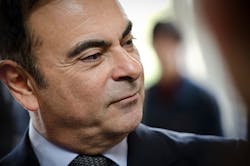Ghosn in Jail Risks His Electric-Car Vision as Tesla Zooms By
Carlos Ghosn was an early proponent of electric cars, telling the world in 2009 that Nissan Motor Co. would lead a revolution to eliminate gas guzzlers with its battery-powered Leaf.
For almost a decade, Ghosn’s $5 billion plan clicked with drivers as the Leaf became the best-selling EV model globally. His commitment while overseeing Nissan and its alliance partner Renault SA helped spawn a wave of competing models from traditional automakers in Detroit, China and Europe, as well as startups like Tesla Inc.
Those rivals are chipping away at the Leaf’s lead by making key advancements in battery capacity, wireless connectivity and autonomous driving, and also by capitalizing on China’s intent to lead the industry into an electric future. Nissan needs to respond, but its plan is hampered by one thing: its iconic former chairman sits in a Japanese jail, accused of committing financial crimes. At this point, the allegations are unproven.
“The Leaf is one of Ghosn’s masterpieces and, under the circumstances, there’s a lot of uncertainty with the model,” said Mei Songlin, former vice president and managing director of China operations for J.D. Power Asia Pacific.
Nissan was set to unveil a new, longer-range version of the Leaf last month in Japan but canceled the premiere after Ghosn’s Nov. 19 arrest. Nissan also called off an event about autonomous driving and EVs with Tokyo Governor Yuriko Koike, a former board member of Nissan partner Renault.
Another unveiling ceremony timed with last month’s Los Angeles Auto Show also was postponed.
At a Nov. 30 event to promote Nissan’s participation in Formula E electric-car racing, Roel de Vries, a corporate vice president, declined to comment on Ghosn but stressed the commitment to EVs.
“This is a long-term effort by the whole company,” he said.
The Leaf is the best-selling electric car ever, with cumulative sales approaching 355,000 units through the third quarter of this year, according to BloombergNEF. Tesla’s Model S is in second place.
But when it comes to cumulative sales of all EV models, Tesla has zoomed past Nissan into first place. The Palo Alto, California-based company sold 145,000 EVs in the first nine months of this year, compared with Nissan’s sale of 66,000 Leafs, according to BNEF.
“It was Ghosn’s pet project,” said Tatsuo Yoshida, an analyst with Sawakami Asset Management Inc. in Tokyo. “Now the father is gone.”
Producing the unprofitable Leaf and its batteries has long been a drag on Nissan profits. After a protracted search for a buyer, the company in August agreed to sell its electric-car battery unit to Shanghai-based sustainable-energy company Envision Group for an undisclosed price, with Nissan keeping a 25 percent stake in the business.
Ghosn’s replacement, Hiroto Saikawa, hasn’t commented publicly about the Leaf’s future since Ghosn’s ouster. But in a conference call with analysts in May, Saikawa said progress with the Leaf was one of the automaker’s highlights for 2017.
“We are achieving good headway,” he said then.
One of his big challenges will be in China, the world’s largest EV market, where the Leaf is an insignificant name amid Tesla and a glut of domestic EVs from BAIC Motor Corp., BYD Co. and Chery Automobile Co., along with startups NIO Inc. and Byton.
In China, Nissan sells the electric Venucia that shares some of the Leaf’s technology. Ghosn has said the Leaf -- retailing for $29,990 in the U.S. -- is probably too expensive for the Chinese market.
By contrast, China is the second-biggest market for Tesla, and the company is working on plans to start a partial production of its Model 3 there next year.
Tesla in October secured land in Shanghai to build its first factory outside the U.S. Local production would allow Tesla to sidestep import taxes that increase its China prices.
“Carlos Ghosn is no Elon Musk in terms of his appealing power to consumers,’’ said Yale Zhang, an analyst with Automotive Foresight Co. in Shanghai. “A lot of Musk fans bought Tesla due to idol worship.’’
Ghosn’s arrest likely won’t derail Nissan’s plan to invest $9 billion in China to seek greater market share. Nissan wants to introduce 20 electrified models by 2022 in the nation, which is implementing requirements next year that automakers build or import a certain percentage of new-energy vehicles.
This year, Nissan found a new approach to bring the Leaf to China. The carmaker will use the battery supplied by Ningde, China-based Contemporary Amperex Technology Ltd. in the electric version of its best-selling sedan, the Sylphy, in China.
In an April interview with Bloomberg Television, Ghosn said companies needed to manufacture locally in order to be competitive in the Chinese market.
Since many governments worldwide are promoting the switch away from combustion-engine cars and toward EVs, Nissan is unlikely to back away from the Leaf, even with the downfall of its biggest backer, said Janet Lewis, an analyst in Tokyo with Macquarie Capital Securities.
“I expect Nissan to continue to pursue EVs no matter who is at the helm,” Lewis said. “This is the direction the market is going.”
About the Author
Bloomberg
Licensed content from Bloomberg, copyright 2016.
